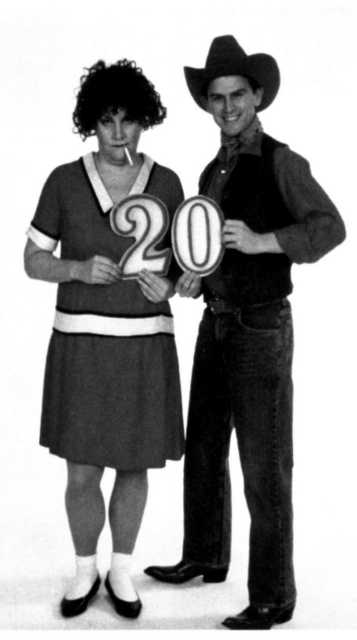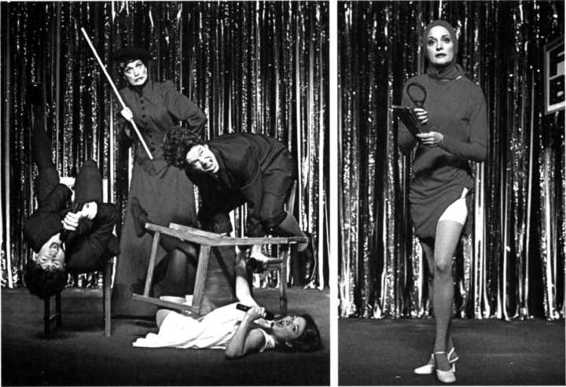Forbidden Broadway: Behind the Mylar Curtain (115 page)
Read Forbidden Broadway: Behind the Mylar Curtain Online
Authors: Gerard Alessandrini,Michael Portantiere

I am honored to have been a part of the twentieth-anniversary edition of Forbidden
Broadway with the incredible Kristine Zbornik, Michael West, and Donna English.
They were all seasoned veterans of the show, and I was coming in as the newbie.
Forbidden was my first paying gig in New York City, so I really wanted to do a great
job. Nervously, I went into rehearsal under the direction of Gerard and the marvelous
Phill George and Bill Selby. The masters of Forbidden Broadway were teaching me the
Cameron Mackintosh number, and Mandy Patinkin,
and the Les Miz medley. It was surreal, because I had
listened to this stuff in high school and college with
my theatre friends and now I was onstage in New York,
doing it.

Daniel Reichard with Kristine Zhornik.
We rehearsed and rehearsed, until one day-like a
bat out of hell, like a ball out of a cannon, like, umm,
a fiddler on the roof-I was thrown onstage into my
first performance. I had had one single rehearsal with
all the costume, wig, and facial hair changes the day
before, and it hadn't gone very well. But in our first performance, everyone kept me on track, and the audience
roared with laughter and cheered heartily during our
curtain call. The show was beautifully reviewed and we
were featured in the New York Times, Entertainment
Weekly, the New York Post, and others. Not bad for my
first time on a New York stage, huh?
When it came time for me to move on from the production, I was auditioning for the lead role in a new
musical, Radiant Baby, at The Public Theatre, under
the direction of George C. Wolfe. Gerard was the only person George could call to ask about my work. I hear that he said some nice stuff,
and I got the part. Truly, Forbidden Broadway began my life as a New York City actor,
and it taught me lessons about performing that still help me in my work. Thank you,
Gerard!
My favorite character to play in Forbidden was Mandy Patinkin; I really got what
Gerard and Phill were making fun of in the lyrics and the staging. It was a total blast
to do every night, and my Mandy was always reviewed as my best impression. I also
loved playing Rex Harrison, even though my colleague and friend Michael West would
joke to me that it was the worst impression he had ever heard.
Once, during a sparsely attended matinee, I was over-enthusiastically singing "It's
Too High" in the legendary Les Miz spoof. At the end of the number, I was supposed
to lift my arms above my head and then quickly bring by hands down to my throat as
if I was choking to death. Well, I somehow hit the microphone out of the stand and
into the audience. There was no one in the first, second, or third rows, and probably
only a dozen or so people in the crowd. Imagine me jumping off the stage, crawling
on my hands and knees through the first couple of rows, trying to find that damn
microphone. All the while, the stage was empty, music was vamping, and one single
audience member was laughing hysterically at me (not with me). I found the mike,
jumped back onstage, hopped on the imaginary turntable, went around in a circle, put
the mike back on the stand, and then imaginary-turntabled myself off that stage!
Any actor who was in Forbidden Broadway secretly (or not secretly) loves it if he is
later portrayed by someone else in the show. When Jersey Boys became a worldwide hit,
I knew it wasn't going to be long before we were targeted. I was delighted to hear that
Michael West was playing me in the sketch. The essence of me, according to Michael?
Just talk in a really high-pitched voice. How rude! I'll never speak to him again.
In October 2007, Forbidden Broadway had a very rude awakening-not the sobering kind, but a new edition called Rude Awakening, named after the musical Spring
Awakening. There may have been lots of teenage angst and depression in that show,
but in ours we were having a fine time celebrating our twenty-fifth anniversary.
To keep a show running twenty-five years takes a lot of gall and clever finagling.
Two of the people who come instantly to mind for their hard work are Harriet Yellin,
our brilliant co-producer, and Glenna Freedman, our press agent since the mid-'80s.
Glenna has certainly done a phenomenal job of cajoling the press; her expertise and
devotion have kept the image of Forbidden Broadway shining. Harriet has been a den
mother to us all, and her presence and love have given the show that "warm, fuzzy
feeling" actors often refer to when describing their experience with Forbidden.
When the big day of our anniversary finally arrived, we had the honor of having
47th Street between Eighth and Ninth avenues renamed "Forbidden Broadway." It
was a great ceremony. There was a mayoral proclamation, and the best part was that
Chita Rivera presented it. After the festivities, it was back to business.
The post-9/11 years on Broadway were interesting in that the era of the blockbuster
seemed to be waning and there were many different types of shows on the boards.
Now, there was room for Spring Awakening and Grey Gardens as well as Jersey Boys.
Somebody figured out that family musicals could be tremendously profitable. I think
that started with Disney, but it crossed over to shows like Chitty Chitty Bang Bang.
If you go back fifty years, a lot of Broadway shows were very sophisticated and
adult, so much so that you couldn't make them into movies without editing some of
the dialogue and the lyrics. (Just ask Cole Porter.) In the early 2000s, all these family
shows like Wicked and the Disney musicals were playing, and I think Grey Gardens and
Spring Awakening were a reaction to that. Broadway sort of split into two camps: 'Are
we going to see something dark, like Grey Gardens, or are we going to see something
pink, like Legally Blonde?"

Left: Jared Bradshaw, Janet Dickinson, James Donegan, and Erin Crosby get "Totally Bleeped" in our version of
SpringAwakening. Right: Janet Dickinson as Christine Ebersole as Edie Beale in our Grey Gardens parody.
It's possible to make a great deal of money on Broadway, and this has led to producers trying to second-guess what the public wants. That's how you get something
like Cry-Baby, which was more or less modeled after Hairspray. Though Mamma
Mia! was a huge success, it was followed by several other jukebox musicals that were
mega-flops: Good Vibrations, Lennon, The Times They Are a Changin: These shows
might have killed the genre-but then came Jersey Boys.
There was another obnoxious trend at the time: People were taking movie musicals,
rewriting them (not always for the better), and putting them on Broadway. I always
wanted to do a number where Noel Coward would come on and sing, "Don't put that
movie on the stage, Mr. Mackintosh, don't put that movie on the stage!"
Again, some original musicals did open in the mid-2000s, but they were exceptions.
I was impressed when I saw Spring Awakening, because I didn't know the original
Frank Wedekind play at all but I had no trouble being drawn into the story. I thought
it took a lot of integrity for the creators of the musical to write the show they wanted
to write. Although the show had a decent run and gained a lot of loyal fans, it never
reached a mass audience, perhaps because of the explicit lyrics.
West Side Story and A Chorus Line were considered edgy and groundbreaking in
their day, but they eventually became mainstream hits. Because this never happened
with Spring Awakening, our audiences never responded fully to our elaborate spoof of
that show. Conversely, many of our other numbers seemed light and silly because there
were so many light and silly shows playing on Broadway. This dichotomy affected the
balance of Forbidden Broadway; to me, some of it felt a little repetitive and whiny.
A definite bright spot of our twenty-fifth anniversary edition was our take on the
latest revival of Company. Since that groundbreaking Sondheim/Furth musical has
substance to it, as well as wit, it was challenging but ultimately a lot of fun to spoof
it. On top of that, it featured major performances by Raul Esparza, a new Broadway
star, and Barbara Walsh, who had appeared in our show. On top of that, the fact that
John Doyle again had the actors doubling as the orchestra was a real gift to us from
the gods of comedy.

"Unaccompanied"
[Moody lights come up on an intense young man as
he enters and then stands center stage. We hear three
voices singing a fique.I
WOMEN'S VOICES OFFSTAGE